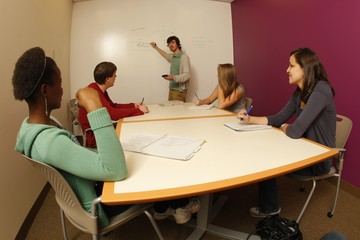Training for Tutors

The Office of Academic Support is certified by the College Reading and Learning Association International Tutor Training Program Certification for Level I. OAS Peer Tutors must complete at least 10 hours of paid training and tutor for at least 25 hours during their first year of employment in order to be certified as a Level I Peer Tutor.
Training is divided into three components:
- Online initial training which must be completed before the initial in person training.
- Initial in person training: Offered during the first week of classes and soon after any additional hiring during the semester.
- On-going Training: Offered on a regular basis throughout the academic year.
Online and In Person Initial Training
All newly hired OAS tutors complete the online and in person initial training within the first week of employment.
Training topics include:
-
The history of the OAS
-
OAS services and staff
-
Tutor Expectations and tutoring strategies
-
Tutoring scenarios
-
Office policies and procedures
-
Learning and other disabilities
-
Learning Styles and how to work with a client's style.
-
Study skills and how to incorporate them into a subject-specific tutoring session.
-
Other campus resources and how to make referrals
The activities involved in training are diverse and interactive. Some examples include role playing, discussion and games.
On-Going Training
Training is offered on a regular basis throughout the academic year. Some sessions are scheduled on Mondays at 3:00 PM (Commons Hour) and an alternate time is also determined so we can reach all tutors on staff. Tutors meet to discuss various office concerns and to do further training activities. Some of the training activities may include:
- Group management
- Tutoring situations and advice sharing
- Motivation
- Using probing questions
- Tutoring specialized student populations
- Other training topics as developed by the OAS staff.